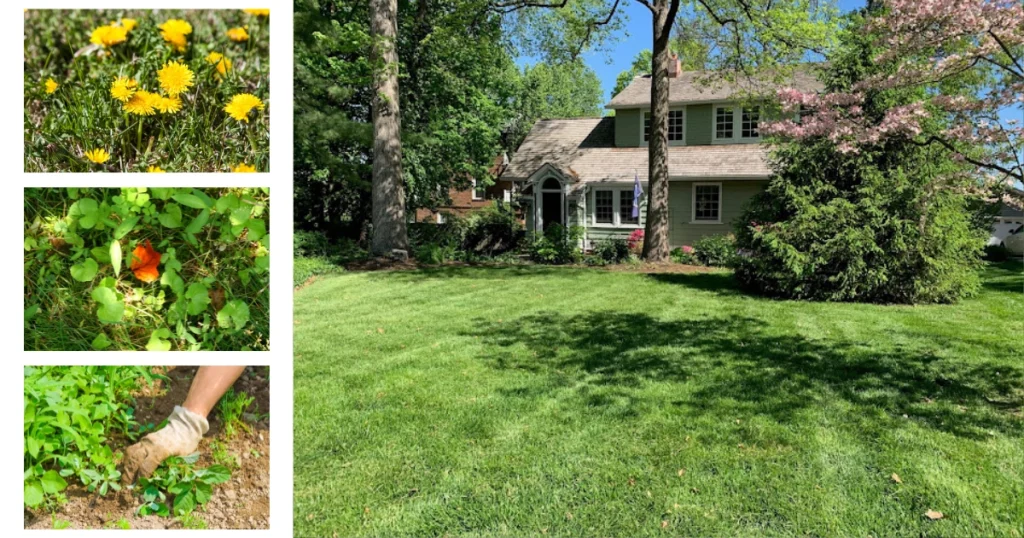We all know by now that traditional weed control is toxic and bad for humans, pets, wildlife, waterways, and even the soil itself. Yes, weed control can be bad for the soil. While synthetic herbicides kill their target, they also destroy the living microorganisms that help your grass thrive. When that underground ecosystem is disrupted, your lawn becomes weaker, and more weeds eventually move in.
So what are safer weed control options for homeowners who want a green, healthy yard without the risks? Does the whole vinegar thing actually work? Let’s dig in.
What’s So Bad About Traditional Weed Control?
Most conventional weed killers contain glyphosate, 2,4-D, or other synthetic herbicides. These ingredients don’t just stop at killing dandelions and crabgrass, they can contaminate groundwater, harm pollinators, and even cling to shoes or pet paws, making their way into your home.
In the soil, these chemicals wipe out the beneficial microbes and fungi that help grass access nutrients and fend off disease. Without those living organisms, your lawn’s root system weakens, leaving open space for weeds to creep through. It becomes a frustrating cycle that typically ends up in using more traditional weed control methods and creating an unhealthy lawn addicted to chemicals.
What Are Safer Weed Control Options?
There are many natural and low-toxicity alternatives to traditional weed sprays. Some are iron-based or use plant oils to kill weeds while remaining safer for your soil, pets, and family. However, even natural weed control products must be used with care. Applying too much or at the wrong time can still damage grass or desirable plants. When in doubt, it’s best to consult a professional who understands how to safely and effectively use these products in a lawn environment.
Here are a few effective products and ingredients that Clean Air Lawn Care Owners may use:
- Iron HEDTA (Fiesta Weed Control) – A selective, iron-based herbicide that kills broadleaf weeds like dandelions without harming grass. It works by oxidizing the weed’s cells, causing them to dry out, while the surrounding turf stays healthy.
- Weed Zap – A natural, fast-acting product made with clove oil and cinnamon oil. These botanical oils break down the weed’s surface, drying it out within hours.
- ADIOS Selective Weed Control – A safe, non-toxic formula made with sodium chloride and organic acids. It’s OMRI-listed, meaning it meets organic standards and can be safely used around pets and children.
- Corn Gluten Meal – Acts as a natural pre-emergent, preventing weed seeds from germinating. It’s a great option for those focusing on prevention rather than spot-treating.
Other safer ingredients include citric acid and essential-oil-based blends that are considered contact herbicides, meaning they kill what they touch but don’t linger in the soil. Just remember, natural doesn’t always mean harmless, so correct dilution, timing, and spot application are key to avoiding damage to your lawn or garden.
Natural and Organic Weed Control Options
The most organic, natural, and safest weed control option is still good old-fashioned hand pulling. It’s labor-intensive but extremely effective when combined with a healthy lawn care routine.
A strong organic lawn is one of the best natural defenses against weeds. By feeding your soil with compost and organic fertilizer, you help your grass grow thick and dense. That density shades the soil, prevents weed seeds from getting sunlight, and naturally keeps weeds from germinating.
You’ll often hear about vinegar, salt, and dish soap as DIY weed killers. These mixtures can work on small areas like cracks in the driveway, but they’re not ideal for lawns. Vinegar and salt are non-selective, meaning they’ll kill grass too, and they can also damage soil biology if overused.
For eco-friendly weed prevention that really lasts, focus on:
- Healthy soil through organic fertilization and composting
- Proper mowing height (3–4 inches helps to shade out weeds)
- Overseeding each season to thicken turf
- Aeration to reduce compaction and improve root growth
When your lawn is thriving, weeds struggle to take hold, making your whole yard the safest weed control you can get.
The Bottom Line
If you’re wondering “What are safer weed control options?”, you’ve got choices. From iron-based herbicides like Fiesta to plant-oil blends and simple hand weeding, there are many ways to manage weeds without harming your family, your pets, or the planet.
By focusing on building a healthy, organic lawn, you’ll reduce weeds naturally and skip the toxic cycle that conventional weed killers create.



